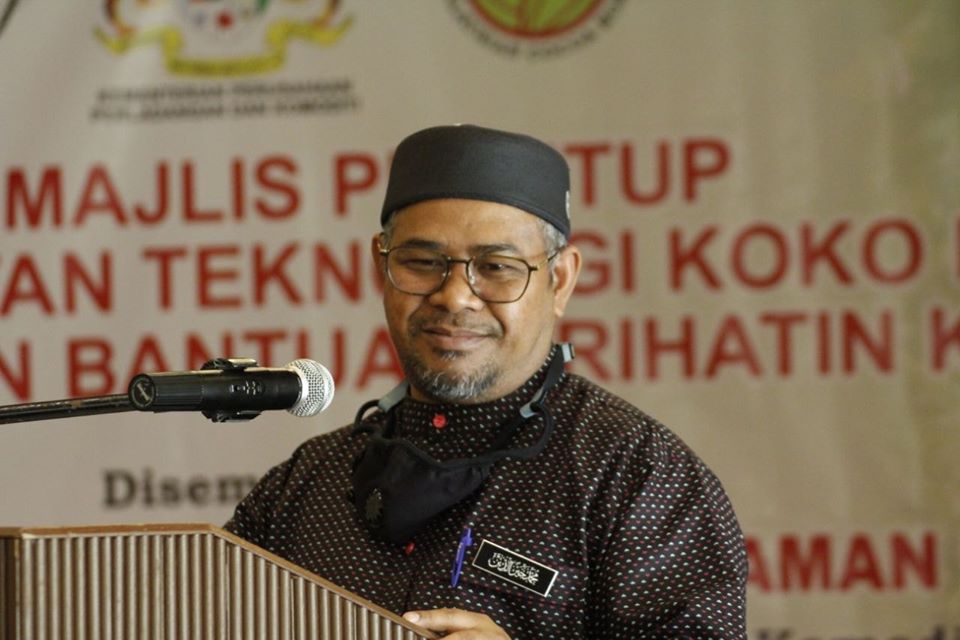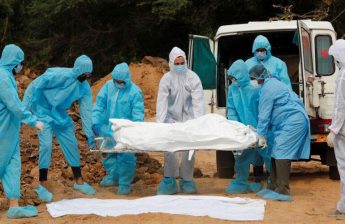Plantation and Commodities Minister Mohd Khairuddin Aman Razali “should be considered a hero even though he broke Covid-19 quarantine rules as his trip to Turkey had brought benefits to the oil palm sector,” PAS spiritual leader Hashim Jasin was quoted to have said.
According to Hashim, Khairuddin, who broke the 14-day quarantine order for all overseas returnees, was not in the wrong. Instead, he claimed the blame lay with the Health Ministry and the Foreign Ministry for being “negligent”.
Khairuddin had gone to Turkey on 3 July, allegedly with his family and unnamed officials. He returned on 7 July. On 13 July, he attended Parliament, which was in session for a critical vote crucial to the government. During the 13 August Parliamentary sitting, MP Teresa Kok asked about this breach of the government’s standard operating procedures (SOP) enforced to stem the transmission of Covid-19 in Malaysia. She also asked whether his travel companions had undergone the mandatory home quarantine.
The Health Director-General said on 25 August that his ministry only knew about Khairuddin skipping his quarantine from media reports the previous week. He did not elaborate on the full report of its internal investigations over this Covid-19 SOP breach.
From a medical point of view, I am thankful there is no known Khairuddin cluster. Our first doctor death (22 March) from Covid-19 was a 49-year-old pathologist with a history of travel to Turkey, where it was believed he may have contracted the virus, although at that time, it had not been listed as one of the major infected nations. He did not contract it as a frontliner.
Since then, Turkey (population 83.15 million) currently ranks 18th in the world for the total number of reported cases. (Malaysia is 93rd out of 215 countries). As of 31 Aug, 6,370 have died out of 270,133 total cases with 1,587 daily new cases.
On 11 June, Turkey’s international borders were opened for travellers from a number of countries, despite having almost 1,000 new cases a day. The Covid-19 Worldometer showed that between 3-7 July, Turkey had over 1,000 new cases daily. By 7 July, there were 207,897 total cases and 5,260 deaths.
This is a really close call for our Members of Parliament.
The rapid antigen screening test at Kuala Lumpur International Airport will miss more than 10% to 15% of infected people with Covid-19 because it is only about 84.4% sensitive, unlike the RT-PCR test which is >90% sensitive, depending on the site and quality of sampling.
The US Centers for Disease Control says: “There are limited data to guide the use of rapid antigen tests as screening tests on asymptomatic persons to detect or exclude Covid-19, or to determine whether a previously confirmed case is still infectious”.
Five Sarawak Covid-19 Cases cleared Kuala Lumpur International Airpot (KLIA) antigen rapid tests: SDMC
The five patients comprised one in Miri who returned from Tunisia, two in Bintulu who came back from Mexico and the United Kingdom, and two in Sibu returning from the United Kingdom and a case from Saudi Arabia.
Effective 1st September 2020, the State Disaster Management Committee (SDMC) of Sarawak requires all Malaysians, including Sarawakians travelling into the state from overseas, to undergo a mandatory 14-day compulsory quarantine at the quarantine centres provided by the Sarawak government.
The Covid-19 test will be taken twice – on the 2nd and 10th day. The cost of quarantine and testing for Sarawakians shall be borne by the Sarawak state government. Non-Sarawakians (Peninsula, Sabah, Labuan, and non-citizens) shall bear their own costs.
Our “pink bracelet” makcik came back from United Kingdom on 4 July, had initially tested negative for Covid-19 at KLIA, but later tested positive. For violating the order on 6 July when she was photographed having breakfast at a restaurant, she was fined RM8,000 and a one-day jail sentence (14 August).
Likewise, the restaurant owner returning from Sivagangga, India, had initially tested negative, breached home quarantine, and later tested positive after infecting at least 45 persons across several states. He was fined RM12,000 and a jail sentence of five months (13 August).
If Khairuddin’s antigen tests had similarly been false negatives, imagine the superspreader event that could have erupted in Parliament.
The enclosed, artificially ventilated hallowed Parliament House – with unmasked persons shouting and talking loudly, freely dispersing lots of aerosol and droplet spray, over hours and days – is a SARS-CoV-2 transmission paradise.
The average age of our 222 parliamentarians is 55.9 years, with 182 who are 46 years and older. Seventy-eight of our MPs are above 60 years, which is a high risk factor for serious and deadly Covid-19, especially those with coexisting chronic medical conditions, hypertension, obesity, diabetes, or those with low immunity from cancer or chemotherapy.
The coronavirus is most deadly if you are older and male — new data reveal the risks
Research teams looking at the presence of antibodies against SARS-CoV-2 in people in the general population in Spain, England, Italy and Geneva, Switzerland have now quantified that risk (28 August).
For every 1,000 people infected with the coronavirus who are under the age of 50, almost none will die. For people in their fifties and early sixties, about five will die, more men than women. The risk then climbs steeply as the years accrue. For every 1,000 people in their mid-seventies or older who are infected, around 116 will die. Men face twice the risk of women.
Other studies confirm that age is, by far, the strongest predictor of an infected person’s risk of dying. The estimated infection fatality rate is close to zero for children and younger adults, but rises exponentially with age, reaching 0.4% at age 55, 1.3% at age 65, 4.5% at age 75, and 15% at age 85. This will be worse in those with co-existing illnesses – as can be seen in many of our 128 Malaysian deaths.
10% and 20% of infected people are responsible for 80% of coronavirus spread
This has been shown by research on actual cases, as well as models of the pandemic. The Tabligh international gathering in Kuala Lumpur (27 February – 1 March) infected 3,375 in Malaysia (37% total cases) and caused 34 to die prematurely. This cluster quickly seeded cases to Brunei, Indonesia, Singapore, Thailand, Cambodia, Vietnam, Philippines, (and Sarawak), and ended only in July after many generations of transmission.
The Health Director General said that up to 27 August, 904 cases were detected from 106,793 travellers arriving in Malaysia at various international entry points. More than 30% are from Indonesia, followed by Egypt with 93 cases, and Singapore with 70 cases.
The world is cracking down on Covid-19 quarantine dodgers
To date, over 80 countries have imposed travel bans or quarantine procedures in response to the Covid-19 insurgency.
A woman in Austria was fined and given a suspended jail term after breaking quarantine to visit a supermarket just days after testing positive for coronavirus.
“Because, as a Covid-19 carrier, she was liable for putting people in danger,” said Judge Christian Liebhauser-Karl. With the ruling, the judge said he wanted to give other infected patients a clear warning: “The general preventive aspect (of this case) is essential, namely deterring others from committing similar felonies.”
Since the start of the pandemic and the introduction of lockdowns, many European states have been handing out fines to people violating quarantine orders, but prison sentences are much less common.
In Norway, anyone caught breaking home quarantine rules faces fines of up to 20,000 Norwegian kroner (€1,860) or a 15-day jail sentence. In Russia, breaking quarantine rules is now punishable by up to seven years in prison.
China and Singapore have taken a tough stance against those dodging stay-at-home orders, including hefty fines and jail terms. In Myanmar, hundreds of people have already been jailed for violating curfews, quarantines, or other movement control orders, according to Human Rights Watch.
In this war against the stealth SARS-CoV-2 virus, health care workers bear the brunt of “friendly fire” casualties. The Indonesian Medical Association reported on 31 August that 100 doctors have died from Covid-19. The Indian Medical Association reported 196 doctor deaths, the majority of them general practitioners till August 7.
This is why medical frontliners, especially doctors (not the PhD ones), will never be user-friendly towards any Covid-19 quarantine dodgers, anywhere, however labelled.

A fusion opinion from a Sarawakian public health specialist, paediatrician, ex-associate professor, disaster relief and medical volunteer, passionate about helping people learn.
- This is the personal opinion of the writer or publication and does not necessarily represent the views of CodeBlue.








